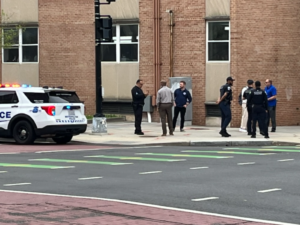The Politics of COVID-19

Image Courtesy of the Wall Street Journal
By Jack Rowing
Last Friday, America’s new coronavirus cases fell below 100,000 a day, a forward-looking update since falling below 200,000 new cases a day earlier this winter. America’s leading medical expert, Anthony Fauci is encouraging “cautious optimism” over recent successes in the decrease of coronavirus cases. However, to place it in context America is by no means out of the thick of the cases. When examining the graph of new COVID-19 cases from the World Health Organization (WHO) (see below), it becomes apparent that while America has drastically decreased from recent months, we are still above where we were in the summer. It is also important to account for the fact that cases are not dropping in every state, 10 states still are experiencing increases in cases.
Experts are examining and debating the reasons for the decrease in the virus, some believe that it is simply the natural end to travel during the holidays, which would coincide with the curve becoming more steep during November and beginning to drop after the holidays, while others have cited the lack of indoor gatherings and the success of various mask mandates and safety guidelines.
The decrease in cases has also been attributed to the rollout of the new vaccines. The Federal government, Center for Disease Control (CDC), and other groups have successfully administered over 55 million COVID-19 vaccines, and have distributed over 71 million doses to the states and counties ready to be administered. Bloomberg’s vaccine tracker has anticipated that America will be at 75% successful vaccination within the next 8 months.
President Biden has criticized the Trump administration’s vaccine distribution and has said that it had a complete lack of a plan, and that his administration started from scratch. Dr. Fauci directly contradicted this claim, stating that ”we certainly are not starting from scratch.” This sentiment of the politicization of the vaccine is by no means new or going anywhere. During the campaign, current Vice President Kamala Harris was criticized for her questioning a vaccine that was rolled out during the Trump administration. After the election, former President Trump said that he believed the vaccine announcement was postponed in order to rig the election towards President Biden’s favor.
Playing politics with the Covid vaccine appears to be becoming commonplace. Writer and commentator Yuval Levin, wrote an article criticizing the current administration’s vaccine plan and their rhetoric around it, chiefly how the Biden plan included the goal of 100 million people in 100 days, or 1 million people vaccinated a day. While this may sound ambitious, it numerically is less than a 10% increase from where the Trump administration had been previously.
Alternatively, as Biden attempts to successfully roll out the vaccine, defeat the virus and reopen the schools in the country, he faces internal disruption from a key Democrat coalition. Biden’s plan to reopen the schools has faced opposition from the teachers unions. The CDC announced that not all teachers needed to be vaccinated before returning to work. This goes against the teacher’s union demand for teachers to be vaccinated before they return to work. Failure to open the schools will be a dismal failure for Joe Biden, as he has committed both in campaigns and in last week’s town hall he loosely committed to the went back on his bold campaign promise and insisted he was going to focus on opening K-8 schooling.
Vaccine distribution, school reopenings, and the defeat of the coronavirus was a key theme for the Biden campaign and his presidency’s success hinges upon being seen as the final vanquisher of the virus. While cases are down, politicization of the virus remains exactly where it has been previously.








